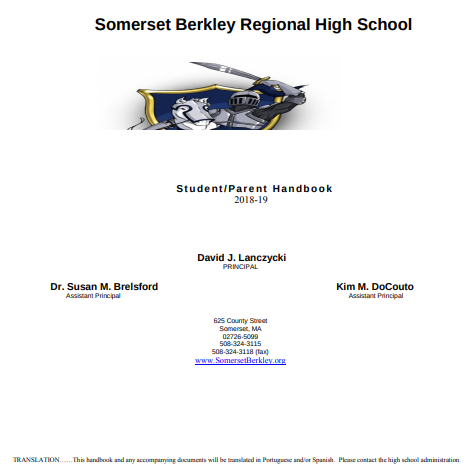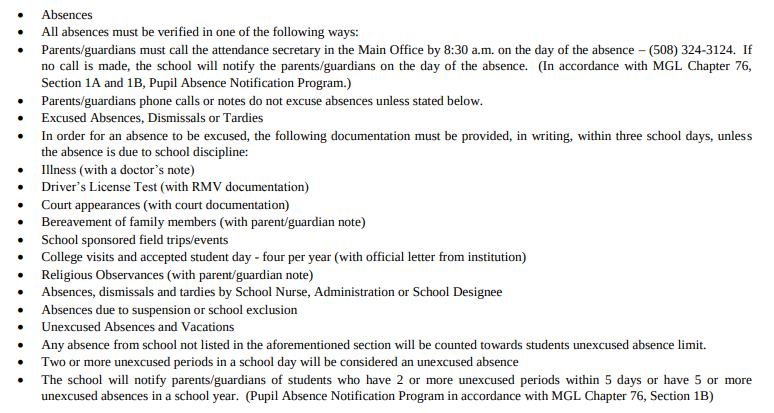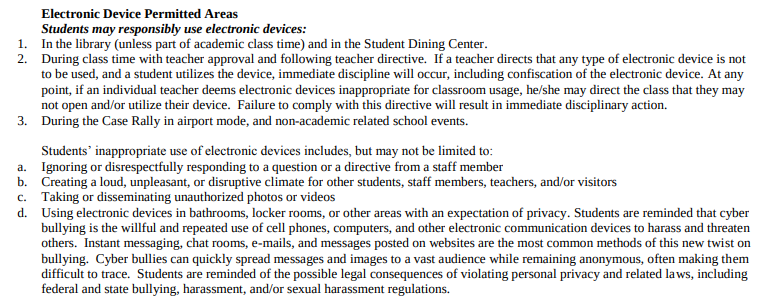The Fault in Our Handbook

Note: This image has not been distorted. This is as it appears in the handbook.
March 12, 2019
Recently, a new handbook committee was established in the school to reform and change the handbook. Throughout my time at SBRHS, I have looked through the handbook and seen some of its problems. However, after hearing about the new committee, I decided to read and mark up the entire handbook.
Overall, the problems with the current handbook go down to one main point: unnecessary repetition. The handbook repeats the same rules over and over again, allowing it to fill a whopping 68 pages. Much of the rules are direct quotations of Massachusetts law followed by an explanation of the law in layman’s terms. I believe that in the new handbook, the explanations should be kept in the handbook and the direct quotations should go in a “References” section in the back. Since most people do not understand the legal jargon anyways, moving the quotes to the back would make the handbook shorter and easier to understand.
A buzzword at SBRHS this year has been “culture change”. Our handbook reflects the culture of the school, both the good and the bad (I mean the handbook has two specific references to Case Rally). It is important that if the school wants to change the culture at the school for the better, the handbook also reflects these changes.
Before systematically going through changes that need to be made to the handbook, it is important to point out what rules should be there, but are not. Firstly, the handbook should include a “Purpose” section to clearly highlight what is to be included in the handbook and what is not included. Secondly, the handbook makes no mention of the required midyears and finals for each class (except for a small mention in the “AP Testing Protocols”). Although this is a well-known rule, it should be written down. Lastly, there is absolutely no policy on cheating nor plagiarism (except in the “National Honor Society” section). Considering how many rumors of cheating seem to be swirling around the school, it is not surprising that it is allowed to happen. A lack of a policy on cheating makes it difficult for students to report cheating and also gives teachers little guideline on how to deal with it.
With that out of the way, here are my “highlights” of the handbook (if you are interested in a full run-down of the handbook, you can email me):
Attendance and Extracurricular Policy
To start off, this section should just be called the “Attendance Policy”. This section talks very little about extracurriculars and there is already another section towards the end of the book called “Extracurricular Activites Rules and Policies”. Some parts of the policy are very difficult to read because of the poor formatting (page 11):

What makes this so confusing is that there should be three different levels of bullet points when there is only one. “All absences must…”, “Excused Absences, Dismissals or Tardies”, and “Unexcused Absences and Vacations” should be a level under “Absences”. Furthermore, everything under those bullet points should also be another level as they are rules of those specific sections. Personally, I had to reread this section alone at least three times until finally understanding what it was saying.
In terms of policy, the absences policy lacks consistency. Students can have four unexcused absences without any penalty. The fifth to ninth result in detention and any following offenses are Saturday schools. Meanwhile, the punishment for one class tardiness is detention. What this policy is effectively saying is that the school would rather have a student absent four times than have a student be late to class once. The class truancy policy adds more insult to injury. Besides the fact that its heading is formatted differently than the “class tardiness” heading (which given the format makes no sense), skipping a class while in school results in a Saturday school. While I can understand the school wants to be able to account for all students, this punishment does not seem to match up with the unexcused absence policy, which only warrants a Saturday school after ten missed days.
Student Behavior
To put it “lightly”, this section is a mess. Nearly the whole section is repetitive of what is already said later on in the handbook, which is not surprising considering there is a section called “Student Conduct” a few pages later. The policy first starts with the subheading “School Committee policy” and “Expectation of students”. The “School committee policy” subheading features the following quote (page 14): “No student has the right to disregard, offend, or treat lightly, either the institution or the officials appointed to maintain it [the Somerset Berkley Regional School District].” (get my section introduction now?) The wording of “treat lightly” is very vague and almost seems arbitrary. What does “treat lightly” mean? Hopefully not writing op-eds about the school’s handbook, because then I’m in trouble.
The section then talks about a random array of rules from weapons, to attendance, to dress code (which already has a separate mention under the “Expectation of students” subheading), to Chromebooks. Some of these rules are in a paragraph mixed in with some Massachusetts laws while others are in list form.
In my opinion, this part of the section should be cut for being unnecessary repetition and the section should be renamed “School Committee Expectations” or something of the like to describe the section more properly.
Dangerous Items
This section gives no definition of what a “dangerous item” is and only talks exclusively about chains. It even goes into the specifics of chains, citing reasonably sized wallet chains are okay. It seems like this policy should just be put under either the weapons policy or the dress code policy. Some things need to stay in the 90s and this policy is no exception.
Inappropriate Displays of Affection
This section gives no real definition which quantifies what makes a display of affection “inappropriate”, which effectively makes the policy useless. The problem is that students often display affection that makes other students uncomfortable, but teachers have no guideline to give discipline on so nothing is ever done. While an in-depth explanation is not necessary, making a line of affection that cannot be crossed would make for a more comfortable school environment.
Electronic Device Policy
While there are many changes that should be made to this section, the most important one is its policy on cyberbullying. Take a look at where this policy is located (page 30):

Did you find it? If not, look at list item “d” under the poorly formatted subheading “Students’ inappropriate use…” List item “d” also starts talking about electronic devices not being allowed in bathrooms, locker rooms and the like until randomly talking about cyberbullying. The school seems to recognize that there are problems with cyberbullying, yet it put its policy in the most random and insignificant place. In this day and age, cyberbullying arguably deserves a section on its own and definitely more than being thrown in with a random list item. As with the policy itself, the cyberbullying policy should also make clear what situations outside of the school SBRHS has the right to deal with (while Massachusetts does have laws about this, none of them are stated or mentioned in the handbook).
Another problem is that the Acceptable Use Policy/Internet Safety Policy is separate from the handbook when they really should be in the handbook, to make sure all important policies can be found in one place.
Lastly, the cell phone part of the policy is outdated. The section makes clear that, “Talking on the phone at ANY time to ANYONE is prohibited.” (page 31) However texting is prohibited, “unless directed for an educational purpose.” (page 31) Firstly, why is only texting okay for educational purposes but not calling? Secondly, does this imply calling is not allowed after school?
Gambling
“All forms of gaming, including card playing, are prohibited.” (page 32) That sentence is probably the vaguest sentence in the entire handbook. Firstly, while gaming is a common word for gambling, does “gaming” in this case apply to all games? Does it apply to the student playing video games at lunch? And if it only applies to gambling why not just use the term “gambling”? Secondly, does card playing refer to all card games non-gambling and gambling alike?
The second of this paragraph then features a bunch of legal mumbo jumbo about what gambling is okay under state law. Want to play a game of bingo? Make sure its conducted under chapter 271 from Massachusetts General Law Part I, Title I, Chapter 4, Section 7 because everyone knows what that is.
Dress Code Policy
This section is rather vague, but that can be understood. As new fashion trends come and go, the school needs to have the freedom to ban articles of clothing that it deems unfit for school. My main problem with the policy is that it bans outerwear, “since the health of students is important” (page 32). How does one’s coat threaten their health? And even if the outerwear did threaten a person’s health, considering everyone here is in high school, would the person not be able to determine they should take it off?
Tobacco Product on School Premises Prohibited
While there is nothing wrong with the policy in this section, this section should be included in the “Alcohol, Tobacco, and Drug Use by Students Prohibited” section or at least not be located several pages away from this section.
Assemblies
While I have criticized many policies for being too vague, this section is way too specific. “Talking, stamping of feet, whispering, whistling and outbursts are discourteous.” (page 36) However, “Loud shouting is permissible during pep rallies.” (page 36) And don’t forget, “Applaud in keeping with the occasion. Never applaud during or after a devotional assembly.” These statements of what is okay and what is not okay is excessive. I think most students would understand what behavior is not okay with a simple, “Be respectful during assemblies.” (page 36)
College Admissions Requirements; National Honor Society; Science Fair Participation
While all three of these sections supply potentially useful information, they all have no place in this handbook. The purpose of the handbook should be to state the rules of the school, and these sections only supply information. While knowing college admissions requirement is important, it really has little to do with the policies that run this institution. As with the “National Honor Society” and “Science Fair Participation”, they are the only clubs to have their rules stated in the handbook, which leads to the question why these two clubs get spots above any other clubs.
Honor Roll
Should a student who received a C be considered for the honor roll? The school’s answer to that question is yes. In fact, a student can actually be on the high honor roll with a C (as long as they have A’s in their other classes). It makes sense then that this rather low bar achievement is rewarded with only a mention in the local newspaper.
Extracurricular Activities
First of all, everything that should be subheadings of this section are just regular headings, which makes this section very confusing to follow. Secondly, this is very nit-picky, but I cannot stand how some parts of this section are in the second person when the rest of the entire 68 page handbook is in the third person.
There is also a section called “Chemical Health Violation” which is a not only a weird way to talk about drugs, but also completely repetitive. The section should just say students need to adhere with the alcohol, tobacco, and drugs policy when participating in extracurriculars.
Lastly, this section is outdated, and has clubs that no longer exist or were renamed while also excluding newer clubs such as Girl Up. However, this is my favorite outdated gem in the entire handbook, “(for example, if the offending student were a member of the Breeze Staff, that student would not be permitted to participate in the next edition of the Breeze)” (page 57). Hopefully someone will realize The Breeze is no longer a printed paper after reading this article.

